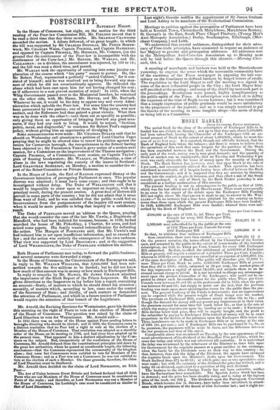Mr. Arnold, the Revising Barrister for Westminster, gave his decision
this morning on the right of Peers to vote at the election of Members of the House of Commons. The question was raised by the claim of Lord Dinorben to vote for Westminster. Mr. Arnold said— In 1641 there was an order of the House against Peers sending letters to boroughs directing who should be elected; and in 1699, the Commons came to a distinct resolution that no Peer bad a right to vote at the election of a Member of the House of Commons. That resolution was adopted as a standidg order of the House on its meeting in 1700, and had since been adopted up to the present time. That appeared to him a distinct adjudication by the Cm- moos on the subject. But, irrespectively of the resolutions of the House of Commons, Mr. Arnold deduced from the constitutional principles laid down by the great law authorities, whom he quoted at considerable length, the following conclusions—that the Commons represented the commonalty of the kingdom alone ; that none but Commoners were entitled to vote for Members of the Commons House; and as a Peer was not a Commoner, he was not entitled to vote at the election of such a Member. On those grounds, therefore, the claim of Lord Dinorben must be disallowed.
Mr. Arnold then decided on the claim of Lord Normanton, an Irish Peer—
The Act of Union between Great Britain and Ireland declared that all Irish Peers who are not Members of the House of Commons must be considered as Peers of the realm ; and therefore, as Lord Normanton was not a Member of the House of Commons, his Lordship's case must be considered as similar to that of Lord Dinorben's.
Last night's Gazette notifies the appointment of Sir James Graham and Lord Ashley to be members of the Ecclesiastical Commission.


























 Previous page
Previous page